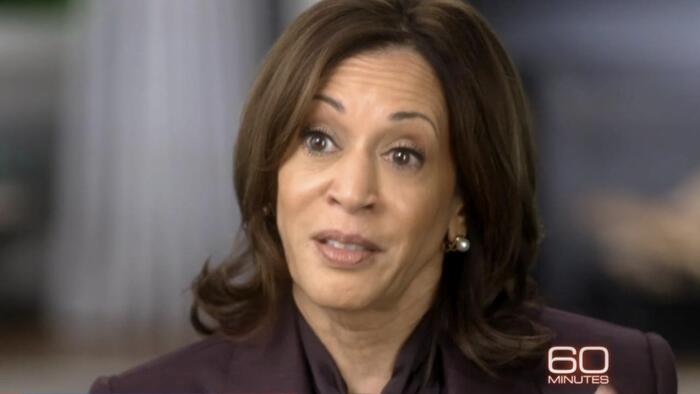CBS has faced significant backlash for the editing of Vice President Kamala Harris’s interview on “60 Minutes,” where her original reply to a question concerning Israeli Prime Minister Benjamin Netanyahu was substituted with a different response in the final broadcast. Initially, when host Bill Whitaker inquired about Netanyahu’s apparent disregard for U.S. perspectives, Harris’s initial comment featured a convoluted phrasing that many interpreted as lacking clarity. However, in the broadcast version of the interview, her words were replaced with a more straightforward assertion regarding the U.S. stance on the ongoing conflict, effectively altering the context and content of her remarks.
The alteration sparked immediate outrage online, with various commentators and political figures highlighting what they saw as a deceptive practice aimed at shielding Harris from criticism. The original clip, which many labeled as typical of Harris’s speaking style, drew scorn and mockery across social media platforms, prompting CBS to retract it from the aired segment. Some observers noted that such editing raised questions about what else may have been omitted or altered during the interview process. This discrepancy became a focal point for criticism against CBS, with allegations speculating on a broader agenda behind the editing choices.
Among the most vocal critics was the Trump campaign, which openly demanded CBS to release the unedited full interview. National press secretary Karoline Leavitt expressed concerns over the integrity of the editing process, accusing “60 Minutes” of diminishing Harris’s gaffe to present a more favorable image. Donald Trump himself weighed in, labeling the manipulation a significant breach of journalistic ethics and suggesting it could amount to election interference. His remarks emphasized an alleged inconsistency between the network’s purported commitment to factual reporting and their editorial choices in this instance.
Moreover, comments from various business and political figures underscored the gravity of the situation. Investor Bill Ackman raised questions regarding the involvement and consent of Harris or her administration in the editing process, speculating that the changes might have been orchestrated to protect her political aspirations. He further criticized CBS executives for allegedly approving the edits, raising ethical concerns around journalistic integrity and transparency. The general consensus among critics was that these actions misrepresented Harris’s position, potentially affecting public perception of her capacity as a leader.
Several social media users and political commentators pointed out that this incident reflects a troubling pattern of media manipulation, noting past examples where “60 Minutes” allegedly glossed over unfavorable narratives for certain political figures, such as during the Hunter Biden laptop controversy in 2020. This perceived manipulation of journalistic integrity prompted discussions about the responsibilities of media outlets in accurately representing political figures and the consequences of editorial bias. For many critics, the re-editing of Harris’s remarks not only highlighted the pitfalls of sensationalized broadcasting but also reignited debates surrounding broader issues of media ethics.
In summary, the controversy surrounding the editing of Kamala Harris’s “60 Minutes” interview has reignited conversations about media accountability and the implications of editorial decisions. As public trust in the media comes under scrutiny, this incident serves as a reminder of the potential consequences when journalistic practices intersect with political motivations. With calls for greater transparency and ethical standards within news organizations, the fallout from this incident may contribute to ongoing discussions about the role of media in shaping political narratives.

